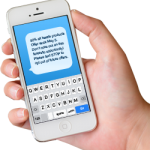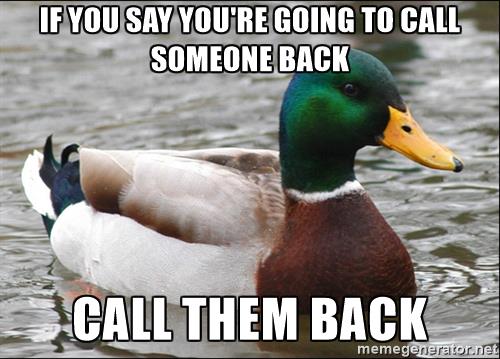Answering your telephone calls. 12 strategies you can use to connect with people on the phone.
 How are you to connect with companies and their staff if they don’t answer their phone?
How are you to connect with companies and their staff if they don’t answer their phone?
The solution.
Forget the idea that somebody will call you back. They won’t.
I covered all the reasons why people don’t call you back in this report here: ‘Why do people not call you back? 4 annoying reasons why.’
Here are some proven ideas that will keep you ‘front of mind’ without sounding pushy:
1. Always get as many phone numbers you can for the person you are trying to connect with.
Get their direct line, their mobile as well as the central office number.
2. You know that they don’t listen to them, but leave at least one voice message if they are unavailable.

“I’m really sorry I called at a bad time . . . . “ Then leave your direct contact number (repeated twice) after giving a vague reason for your call. Don't be too specific about why you are calling. They will make up their mind that they are not interested and NEVER take your call.
3. If they don’t respond within 24 hours send them a text message.
 Say “I’m sorry you missed my call yesterday. I must have called at a bad time for you. When is a good time for me to call? We might need three minutes.” Then give your details. People appreciate it when you acknowledge that they are busy.
Say “I’m sorry you missed my call yesterday. I must have called at a bad time for you. When is a good time for me to call? We might need three minutes.” Then give your details. People appreciate it when you acknowledge that they are busy.
4. Set up a calendar strategy of your own to remind you to call them back.
Make reminder appointments with yourself to call people (and why). Write the date and notes on each call in the ‘notes’ section of your calendar event. That way you can pick up on the personal details of their world. Like the fact that they have returned from a holiday to Bali, or have been off work with the flu. People warm to you if you remember things that are important to them.
5. Write down what you are going to say.
This is so you don’t get flustered and fumble over your words. Make it ‘your words’ not a script you have to read. Inject the occasional pause or “um” to show you are genuine.
6. Always find out their full name before calling.
One way to do this is to ask the receptionist if she can help you (they are usually people who love to help). When she says “Yes, if I can”, I’m sending the finance director a letter and I don’t want to make a mistake spelling his name. Can you help me with the correct spelling? Usually she will give you the name she has been told never to give out. (She hasn’t really given it out – only the correct spelling ;-).
When you get through to them say:
“Hi is this Alex?”
“yes” they answer;
“Alex Hutchison?” you say.
You have jolted them away from what they had on their mind. You now have their complete attention for two minutes. (Don't waste it.)
7. Always use their first name three times during the initial call.
Why?
Firstly, you’ll be more likely to remember it.
Secondly, people love to hear their own name. Don’t you feel it’s the sweetest sound in the entire world when somebody says your name?
8. Somehow, get them to laugh (or at least smile) early in the call.
Why? Well, they are at work. They have pressures. They have other people who want their attention. Try this:
“Alex, my name is Paul Johnson” [no, don’t use my name;-) use your full name].
Why state your FULL name?
Well, you are showing them that you are prepared to be open and vulnerable. People like that.
“You don’t know me . . . but that could be an advantage”. At this point they usually chuckle.
You have broken down another barrier to connection. They will trust you.
9. ‘Never leave an appointment without booking another time to connect’.
This old strategy ensures that they will be expecting your call and that they agreed to have you call back.
Are you sending them something to read? Tell them that you will be making a courtesy call in a couple of days to make sure they received it.
10. If you sent them a quote or something for them to consider, ALWAYS call back three days after sending the quote.
This is a well-researched strategy that been shown to increase your ‘close ratio’ by 20%! You fail to include this step to your peril. Why work 20% harder than you have to?
11. Book the future call into your calendar as an appointment with the reason for the call.
12. Call them back – like you said you would.

Many people will appreciate the reminder to do what they said they would do for you. Those who are offended (about 3%) that you called back when you said you would, are not worth your business. Forget them!
‘You can’t make an omelette without breaking eggs’.
These strategies, when practiced will multiply your business and endear you to many.
Let me know how you go. Email me on paul@missingpiecemarketing.com.au
Cheers,
Paul Johnson
p.s. People who liked this, also liked ‘Why do people not call you back? 4 annoying reasons why.’
They also liked ‘Why are your emails ignored?’








